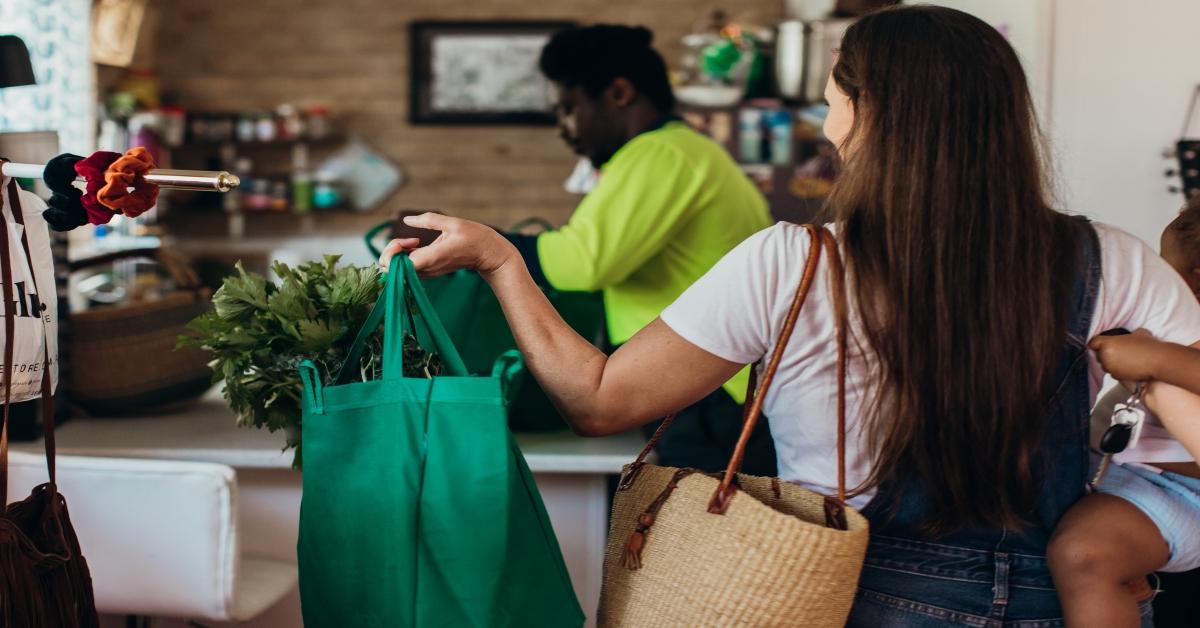How to Wash Reusable Grocery Bags
Do I *really* have to wash my grocery bags?
Updated Oct. 21 2020, 2:57 p.m. ET

A few years back, the world at large started to take notice of something that environmentalists and green living advocates had known for years: Plastic shopping bags are bad for the environment. They don’t biodegrade, they are mistaken for food by animals who then die as a result, and they contribute to a growing trash problem the world over.
Thankfully, the invention, nay, normalization of the reusable shopping bag has really caught on in recent years. Some countries and U.S. states have banned the old disposable bags entirely, causing many people to become completely reliant on reusable bags. But even if you use them all the time, ask yourself, when was the last time you washed your reusable grocery bags? Most people won’t have an answer and if they do, chances are good they didn’t wash them properly. Luckily, we know just how to help.

How dirty are my reusable grocery bags?
Experts consider reusable grocery bags to be “high-touch items.” This means that they are frequently touched by hands and the many foodstuffs and non-food items that temporarily call them home. A study by the University of Arizona and Loma Linda University found that 51 percent of all reusable bags contained coliform bacteria. Another 12 percent contained E. coli, something that is commonly found in fecal matter. That probably means that you should wash them, at least once in a while.
In the age of COVID-19, the idea that an item you use all the time could be coated in germs should give you pause. Considering how many people were wiping down their groceries with Clorox wipes at the start of the pandemic, it might be time to consider at least cleaning these out before attempting to put food back in them again.

Does cross-contamination happen in my reusable grocery bags?
Cross-contamination happens when raw meats and produce touch either one another or touch other pre-cooked foods. Most people already know to separate their groceries by type when packing them away: meat and wrapped dairy in one bag, produce in another, and so on. But how often do you pay attention to which bag is “the meat bag” and which is “the not meat bag” when you’re rushing to get out of the supermarket?
Even if you don't eat meat or animal products, regularly cleaning your reusable grocery bags is still advised, as there could be cross-contamination in the store.
Cross-contamination has always been a problem concerning reusable bags and it seems like no one has looked at the long-term ramifications of it. Plastic bags may be the safer option when it comes to avoiding cross-contamination, and even some staunch environmentalists will advocate wrapping susceptible or carrier foods before packing them together. However, that does not help with the plastic problem, it only minimizes it. To truly be rid of single-use bags and to avoid cross-contamination, you’ll need to be prepared.

How do I clean my reusable grocery bags?
Before you throw your bags in the wash, be sure to remove and clean any vinyl inserts from the bottom of your bags with a disinfecting spray. Turning the bags inside out will make for an easier cleaning process and will allow you to reach all the nooks and crannies where germs like to hide.
Most vinyl bags can be hand washed or wiped down with hot water with your usual dish soap or detergent. This heat is essential for killing E. coli and other such bacteria.
Canvas, cloth, jute, mesh, hand-knit, or crocheted grocery bags should be either machine washed or hand-washed (ideally in warm water) and air-dried. The same drying applies to canvas or vinyl bags as well.
Do not bring any wet bags with you to the grocery store! Germs and bacteria love moisture and it will only make matters worse. If you don’t have time to hand-wash, spraying the insides down with Lysol or another disinfectant may do the trick in a pinch; but obviously we’d prefer you properly clean the darn things.

How often should I wash my reusable grocery bags?
A good rule of thumb for cleaning reusable grocery bags is to wash them after every use, just as you would with a towel or a dishrag. This is especially true for bags that you use for meats, produce, and precooked foods. Essentially, anything that might touch raw meat, your kitchen counter, shopping bags, or your hands, should be washed afterward.
How else can I avoid any cross-contamination?
There are other ways to avoid cross-contamination and ensure future cleanliness as well. One extra step can be done ahead of time. First, designate and label the bags you plan on using for different purposes. One for meat, dairy, dry goods, cleaning products, etc. That way, you won’t be switching them in and out as you rush to finish bagging everything.
Another method is to avoid leaving unwashed bags in your car or anywhere else where bacteria can flourish. Finally, stop using the reusable bags you use at the grocery store for carting around towels, swim trunks, and gym clothes. All those things love bacteria and they absorb and leave it behind easily. Differentiate your bags from one another so that you have totes for every day and reusable bags for shopping. You’ll be happy that you did.